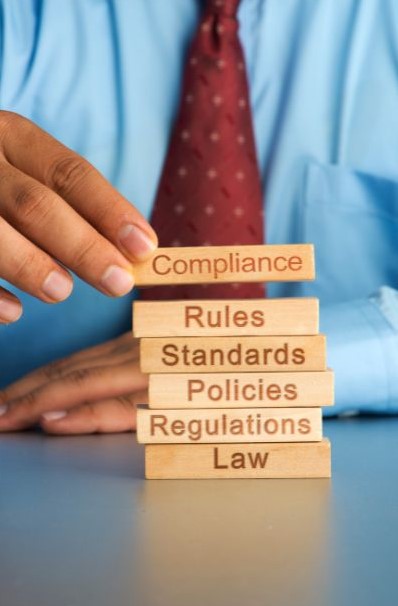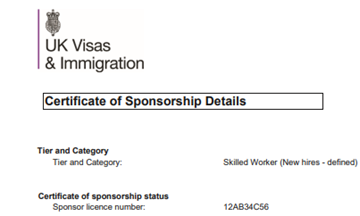The Biggest Problems Companies Face During a Sponsor Licence Application
The Real-World Stress of Applying for a Sponsor Licence

If you’re an HR leader, People Manager, or Director responsible for sponsoring overseas workers, you’re probably feeling this frustration: “Why is this so hard?”
You know you need a Home Office sponsor licence to hire talent from outside the UK. But the process? It feels overwhelming. The rules seem complicated and constantly changing. And the decision-making? That’s a whole other challenge, inconsistent, unclear, and often subject to human interpretation.
At Immtell, we’ve guided companies of all sizes and industries through this complex system. As regulated experts with experience ranging from Home Office caseworker and compliance roles to Big 4 advisory teams, we understand both the official rules and how they are applied in real-world scenarios.
In this article, you’ll discover:
- The most common and costly mistakes businesses make
- How shifting Home Office behaviours impact applications
- What you really need to prepare for, beyond just filling out forms
- The true cost of doing it right
Why Sponsor Licences Matter – And Why It’s Not Just a Form-Filling Exercise
A Home Office sponsor licence allows your organisation to legally hire non-UK nationals on work visas, such as the Skilled Worker visa or Global Business Mobility routes.
But getting a sponsorship licence isn’t just about access. It’s a commitment to compliance. When you apply, you agree to be monitored, audited, and held accountable by the Home Office for how you recruit and manage migrant staff.
The complexity isn’t only in the rules themselves but in how they’re enforced by real people whose interpretations can vary. We’ve seen similar sponsor requests approved by one caseworker and questioned by another. It’s unpredictable and rarely black-and-white. That’s what makes preparation and precision so important.
Problem 1: Underestimating the Cost
Many businesses approach the Home Office sponsor licence process with a narrow focus on Home Office fees. Understandably so, these fees are a significant upfront cost. However, they represent only one piece of the overall cost puzzle.
As of 2025, the UK government lists the following fees for sponsor licence applications:
| Type of Licence | Fee for Small or Charitable Sponsors | Fee for Medium or Large Sponsors |
|---|---|---|
| Worker | £574 | £1,579 |
| Temporary Worker | £574 | £574 |
| Worker and Temporary Worker | £574 | £1,579 |
Small sponsors are defined as organisations where two or more of the following apply:
- Annual turnover is £15 million or less
- Total assets are £7.5 million or less
- Fewer than 50 employees
But the real costs extend far beyond these fees:
- Staff Time: Coordinating documents, responding to requests, and reviewing policies require substantial internal resources.
- Delays: An incomplete or unclear application can lead to delays, which may result in returned or refused applications. These setbacks can derail entire projects.
- Legal and Consultancy Support: Engaging legal or consultancy services is often necessary, especially for complex job roles or organisational structures. This can significantly add to the cost.
- Corrective Action: If an application is refused, reapplying under scrutiny can be costly. One company approached us after attempting a DIY application. Their five-page refusal letter raised concerns that took three months to resolve, resulting in the loss of talent and project delays worth tens of thousands of pounds.
This story highlights the hidden costs and risks associated with underestimating the complexity of the sponsor licence process. It’s not just about the financial costs; it’s also about lost opportunities and time wasted navigating bureaucratic hurdles.
Problem 2: Unclear Role Requirements and Poor Job Descriptions
When submitting job roles to the Home Office, companies must align them with specific Standard Occupational Classification (SOC) codes as outlined in Appendix Skilled Occupations of the Immigration Rules. Sounds straightforward? Unfortunately, many businesses stumble here.
Common pitfalls include:
- Roles That Don’t Match Permitted Occupations: Ensuring that the job aligns with an eligible occupation code.
- Salaries That Fall Short of Updated Thresholds: Keeping up with the latest salary requirements is a must to avoid application issues.
- Vague Responsibilities: Job descriptions need to be detailed and specific, as generic descriptions won’t pass muster.
The challenge deepens because the Home Office doesn’t just tick boxes. There’s a growing focus on context, understanding how the role fits within your business, its relevance compared to other similar roles, and even how it aligns with your company’s overall mission.
Caseworkers might go beyond your application and look at your website, review job adverts on your careers page, and draw conclusions based on that broader view. This human element, coupled with varying interpretations, makes it a priority to tailor your job descriptions and role requirements carefully to avoid scrutiny and ensure successful applications.
This approach requires not just technical compliance but also an understanding of how your organisation’s story aligns with the application. By ensuring consistency and clarity, you can navigate these complexities more effectively.
Problem 3: Record-Keeping and Compliance Worries
Many companies view the sponsor licence process as a “one-time check-off.” However, this mindset can land you in trouble. Maintaining a sponsor licence is not a static process; it requires ongoing attention and meticulous record-keeping.
Here’s what you need to track and record:
- Critical Details: Working locations, visa expiry dates, absences, and job changes for each sponsored worker.
- Recruitment Process Evidence: Detailed records of how you advertised and selected candidates.
- Timely Notifications: You must inform the Home Office within 10 working days of any changes, such as job changes or new working locations.
It’s not just about maintaining good files; it’s about building a robust compliance system. Without this, you risk being ill-prepared for the inevitable audits, or worse, unannounced Home Office compliance visits. These visits can happen at any moment, and if you’re not ready, the consequences can be severe.

We’ve worked with businesses that thought they had everything in order but found themselves facing licence suspensions due to gaps in their HR files, missing contracts, outdated job titles, and incorrect sponsor notes. In a rush to fix these issues, they were forced to dedicate valuable time and resources to resolve the problems. This stressful and costly situation can be avoided with proper planning and adherence to compliance requirements.
Problem 4: The Genuine Vacancy Requirement Is a Major Home Office Focus Area (2025 Update)
The genuine vacancy requirement is no longer a minor consideration; it has become a major focus for the Home Office in 2025. They are now carefully checking whether the roles sponsors apply for:
- Actually Exist: Reside within the company’s operations.
- Are Necessary: Are crucial for business operations.
- Are Suitable: Align with the requirements of the Skilled Worker route.
This increased scrutiny extends beyond the initial application phase. Home Office officials are increasingly demanding detailed evidence during:
- Annual Allocation Renewals
- Requests to Increase Certificate of Sponsorship (CoS) Allocations
- Defined CoS (DCoS) Requests for candidates outside the UK
In each of these contexts, sponsors may be asked to provide extensive documentation, including Organisational Charts, Contracts, or Project Plans Rationale: A detailed explanation of why the role is needed and why it cannot be filled by someone settled in the UK.
One challenge is that this process isn’t consistently applied. Some businesses navigate it without issues or delays, while others face intense questioning. For instance, we had a client whose DCoS request was delayed by weeks because the caseworker requested evidence of internal recruitment efforts, even though the official guidance did not strictly require this.
Our advice? Prepare thoroughly for every interaction. Present your case proactively and transparently, because sometimes, the impact of what you say depends on how it’s perceived. It’s essential to anticipate potential questions and have robust evidence ready to support your application.
Problem 5: Lack of Internal Readiness and Staff Training
Even after your company secures a Home Office sponsorship licence, many businesses don’t invest enough in building the right internal knowledge. This often leads to costly mistakes such as:
- Missing important reporting deadlines
- HR staff recording incorrect data due to lack of training
- Poor communication between hiring managers and those managing the sponsor licence
- No clear understanding of what actions trigger compliance risks
Sponsoring overseas workers is a serious legal responsibility, just like managing your payroll system, so it requires trained, knowledgeable staff.
We’ve worked with teams who didn’t know that changes like working locations had to be reported to the Home Office. One client even received a warning letter without realising how close they were to losing their licence.
Investing in thorough staff training and transparent internal processes not only helps you avoid penalties but also ensures your sponsor licence remains in good standing and your business operates effectively.
The Hidden Cost of Getting it Wrong
If your sponsor licence application is refused or delayed, the impact goes far beyond the initial setback. The consequences can be costly and widespread:
- Lost Talent: Highly sought-after candidates may choose competitors instead, leaving your business without the expertise it needs.
- Delayed Business Plans: Contracts or expansion plans may stall until your licence is approved, affecting your business’s momentum.
- Internal Strain: Your team might scramble to reallocate resources, adding stress and pressure on internal operations.
- Future Scrutiny: You may face increased scrutiny from the Home Office in future dealings, which will add to the complexity of your compliance efforts.
Add to these costs the financial burden of paying again, which includes not just Home Office fees but also expenses for rework, advisory services, and potential damage to your company’s reputation.
Under-preparation is often the most expensive mistake. It pays to get it right the first time, both in terms of money and peace of mind.
What the Home Office Is Really Looking For
The Home Office wants assurance that:
- Your Business Has a Legitimate Need: There must be a genuine reason for sponsoring workers, meaning the jobs are real and needed for your business operations.
- Roles Are Skilled, Necessary, and Correctly Classified: The roles must align with the required skill levels and be classified correctly under the immigration system. They should be needed for your business operations and meet the criteria for sponsorship, such as being on the approved list of occupations.
- You Understand Your Duties and Have Systems in Place: Your business must understand its responsibilities as a sponsor, including maintaining detailed records, reporting changes, and having robust HR systems to manage sponsored workers.
- You Won’t Try to Cut Corners: The Home Office wants to see that you are committed to following the rules and maintaining compliance without taking shortcuts, which could undermine immigration control.
The assessment isn't just about completing forms; it also considers how your internal practices align with your application, what is not explicitly stated, and how well you can demonstrate compliance in practice.
Behind every decision is a human caseworker who interprets the rules based on their experience, workload, and the pressure they are under. This variability means that preparation and clarity in your application are key to avoiding misunderstandings.

How Immtell Helps Clients Avoid Common Pitfalls
1. Cost Underestimation: Immtell prevents financial surprises through readiness reviews that map out all potential costs (e.g., Home Office fees, legal support), and tailored application preparation to avoid rework expenses related to refusals. Our mock compliance audits proactively identify compliance gaps that could lead to penalties
2. Role Misclassification: Our team provides SOC code alignment guidance, ensuring roles meet skill and salary thresholds and are adequately justified through CoS support. This includes advising on job description phrasing that meets the Home Office's "genuine vacancy" tests.
3. Compliance Failures: Immtell's HR training programmes teach teams to maintain sponsorship management systems, track visa expirations, and meet 10-day reporting deadlines.
4. Genuine Vacancy Scrutiny: We support with organisational charts, project plans, and recruitment rationales that pre-empt caseworker questions about the necessity of the sponsored role.
5. Staff Preparedness Gaps: Through leadership training and mock immigration compliance audits, Immtell ensures HR teams understand sponsor duties, from role change notifications to salary change reporting. Our pre-application coaching transforms compliance from a reactive burden to a proactive strength.
Why Immtell's Approach Works
- Home Office Insight: First-hand experience with compliance casework helps anticipate how different caseworkers might interpret rules.
- Prevention-Focused: Our immigration compliance audits and training address issues before they trigger warnings or licence suspensions.
- End-to-End Support: From initial licence applications to ongoing CoS and visa application support for employees, we maintain consistency in compliance standards.
By combining regulatory expertise with operational pragmatism, we ensure businesses retain both their licence and their competitive edge in global hiring.
What It Actually Costs to Get It Right – Realistic Ranges
Here’s what businesses typically invest with Immtell, based on size, complexity, and urgency:
| Service | Typical Fee Range (excl. VAT) |
|---|---|
| Home Office Sponsor Licence Application Support | £4,000 – £6,000 |
| Defined Certificate of Sponsorship (CoS) / Additional CoS Allocation Support | £1,000 |
| Mock Immigration Compliance Audit | £3,000 – £5,000 |
All packages include access to our expert team, thorough documentation reviews, and support through Home Office queries. We work with fixed fees to avoid surprises, aiming to help you pass your application the first time and maintain compliance long term.
Do It Right the First Time — Or Risk Delays, Rejection, and Bigger Bills Later
The sponsor licence system isn’t static. Rules change. Salary thresholds rise. And how those rules are interpreted shifts, case by case, reviewer by reviewer.
If you’re thinking about applying, or you’ve already got a licence but feel uncertain, we offer clear, honest advice based on what actually works.
Don’t gamble with your licence — or your reputation. Let’s talk.
About the Author
Gavin Webster is the Director of Immtell, a UK immigration and global mobility consultancy that helps businesses navigate sponsor licensing, workforce compliance, and strategic international hiring. With a career spanning over 20 years in both government and private sectors, Gavin offers a rare and trusted perspective that combines deep operational insight with practical business sense.
Unique Home Office Perspective
He began his immigration journey on the front line working at the UK’s ports of entry as an immigration officer, later moving into enforcement, and then representing the UK as a visa officer at diplomatic posts across Africa. After returning to the UK, Gavin spent several years as a Home Office compliance officer, conducting sponsor audits and working directly with employers to assess and enforce their obligations.
In total, Gavin spent over 13 years working inside the Home Office, gaining firsthand experience of how immigration policy is developed, applied, and enforced, and more importantly, where businesses often fall short.
'Big 4' Problem Solving
In 2016, he moved into the private sector, joining two of the Big 4, EY and PwC, which spun off to form Vialto Partners, where he advised multinationals and high-growth businesses on how to manage global mobility effectively, meet their compliance duties, and build immigration strategies that supported scale and speed. His experience advising across sectors from healthcare to tech led to the launch of Immtell, created to offer employers straightforward, expert-led support with immigration and mobility.
Today, Gavin works with corporates, SMEs, and organisations that need clarity and confidence when hiring international talent. His expertise spans the full lifecycle of sponsorship from applying for a Home Office sponsorship licence through to CoS management, visa support, staff training, and audit preparation.
Complex Sponsor Licence Support
For one healthcare provider struggling with internal disorganisation and escalating Home Office scrutiny, Gavin restructured their sponsorship systems, trained their HR leads, and introduced a compliant process for tracking and reporting. The result was a 40% reduction in visa processing delays and a renewed A-rated sponsor status that allowed them to continue growing their care team.
Local Expertise
Through Immtell, Gavin also partners with a trusted network of global experts to offer broader mobility solutions, including relocation support, business travel and compliance advice, and long-term workforce planning. His work is underpinned by a clear, collaborative approach, shaped by years of seeing where real risks, and real opportunities lie.
Helping a Tech Startup Scale...Fast
In one case, a fast-growing tech startup facing a mission-critical talent gap approached Immtell with an urgent need to sponsor overseas engineers. Gavin helped secure their Home Office sponsor licence, trained the internal team, and supported the preparation and assignment of 15 Skilled Worker visas, all within three months. This allowed the company to hit key project milestones without compromising timelines or compliance,
Whether resolving complex compliance issues, guiding first-time sponsors, or helping scale global mobility programmes, Gavin’s role is consistent: to act as a steady, strategic partner who makes immigration work for the business, not the other way around.
Download Your Free Home Office Sponsor Duties Guide
Are you confident your business fully understands and meets its Home Office sponsor duties? Avoid costly compliance mistakes and stay ahead of government requirements with our comprehensive, easy-to-follow Sponsor Duties Guide.
Get practical insights and step-by-step advice to help you:
- Understand the sponsor licence "key personnel" requirements and duties
- Maintain your sponsor licence compliance
- Prepare for Home Office audits
- Streamline your sponsorship processes
- Support your international workforce effectively
Download the guide now—no strings attached, and take the first step toward peace of mind and confident global hiring.
Let’s Connect
If you’re seeking an immigration partner with a full suite of global mobility support, Gavin is here to help. Contact him on Linkedin, email gavin@immtell.com or +44(0) 7764 789036 for guidance tailored to your goals.


Ready to secure your sponsorship licence without the headache?
Let’s get started today! Whether you're just about to apply or are navigating the complexities of maintaining your licence, our expert team at Immtell is here to help.
Let’s get started today! Whether you're just about to apply or are navigating the complexities of maintaining your licence, our expert team at Immtell is here to help.









